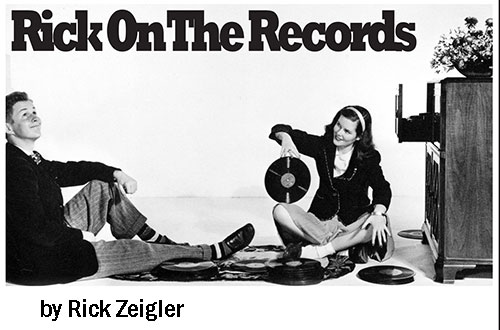
|
Broad Ripple Random Ripplings

The news from Broad Ripple
Brought to you by The Broad Ripple Gazette
(Delivering the news since 2004, every two weeks)

|
| Brought to you by: |

|

|

|

|

|

|
Converted from paper version of the Broad Ripple Gazette (v07n04)
Rick On The Records - by Rick Zeigler
posted: Feb. 19, 2010

THE DEATH (AND LIFE) OF MUZAK
Muzak filed for bankruptcy early last year. The company, started in 1934 to supply background music for hotel elevators, lobbies, and restaurants, achieved its greatest notoriety in the fifties and sixties by pumping bland instrumental versions of popular hits into grocery stores, doctors and dentists' offices, and seemingly every other commercial space in the country. Such music became so ubiquitous that it was designated with the company moniker, "muzak," similar to how facial tissue has become known as Kleenex.
The music was easily identified by its lack of any sort of beat (or beat-producing instruments), with tunes reduced to string-laden melodies and gentle choral-style vocals that replaced anything and everything unique to the original songs. Growing up, it was very annoying to hear Beatles or Stones tunes reduced to rubbish or recent hits denuded of any semblance of originality or catchiness. Of course, this was the whole point. "Muzak" was not supposed to catch or hold your attention. It was designed precisely to "caress" (the company's term) the listener into a sense of distracted, satisfied complacency in whatever environment it was played. For a true music lover, it was simply horrible.
Today, you rarely hear such blanded-out music, even from the Muzak corporation, itself. It's not as if music is no longer pumped into public spaces. Indeed, the concept behind muzak is more ubiquitous now than ever. But today it is usually the original songs that are used, from Nirvana to Motown to Pearl Jam to Mariah Carey and, yes, even the Beatles and Rolling Stones. As much as I hated muzak, I'm not sure this is an improvement. Buying groceries to the Stones' "Satisfaction," or waiting in the dentist's office and hearing "Smells Like Teen Spirit" (both true experiences) may actually be worse than being subjected to their "tamed" versions. For at least when muzak came on, it was fairly easy to tune out their "caresses" once you got over the annoyance of what had been done to the songs. It's much harder to tune out the original versions. Robert Christgau once said that the essence of a good pop or rock and roll song is "repetition without tedium". But when songs that fulfill this criterion are repetitively placed in tedious environments (i.e., most commercial spaces), what then? One possibility, and the one experienced by this listener, is that even the original tunes begin to blend into the background and become "blanded out". Try going home after hearing a favorite song in the grocery store and putting on the same song. The emotional connection you have felt to that song will be subtly diminished by its association with the store experience. (Record stores are, of course, exempt from this criticism, as they play music precisely to call attention to it, rather than to use it as background noise.) This phenomenon is also readily experienced when a song becomes the backdrop for a commercial. The commercial associations will almost inevitably intrude on whatever emotional connections and imagery the song has previously conjured up in the listener.
In short, the omnipresent musical soundtracking of our daily activities, often celebrated, is far from an unalloyed good. And while Muzak, itself, may be bankrupt, the idea of turning music into a background phenomenon is stronger than ever. Shutting out the outside world with an I-pod (or, in olden days, a transistor radio) is one thing. Incorporating music into the mundane tasks of our daily lives -- with the tasks, not the music, in the foreground -- is quite another. There is much to be said for listening to music during times designed to do precisely that. To the extent that experience is lost and displaced by listening as part of a "multi-tasking" experience, the power and importance of music in our lives is surely diminished. Many current commentators have said over the last decade that the ability to get pre-recorded music for free on the internet lessens its importance in our lives and "devalues" it. However, the current trend of the way many (most?) of us actually listen to and experience the music we do hear may devalue it even more.
Rick Zeigler, along with his wife, Jeanne, owns Indy CD and Vinyl at 806 Broad Ripple Avenue. Back in his musician days, his band opened for the likes of U2, XTC, Gang Of Four, The Pretenders, Los Lobos, and, um, Flock Of Seagulls, among others. You can read all of Rick's reviews at www.indycdandvinyl.com. Email your music questions and comments to rick@BroadRippleGazette.com
rick@broadripplegazette.com

|

|

|
| Brought to you by: |

|

|

|
| Brought to you by: |

|

|

|
| Brought to you by: |

|

|

|
| Brought to you by: |


